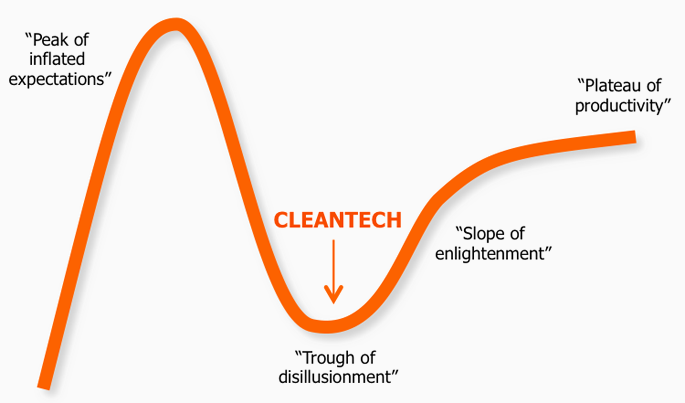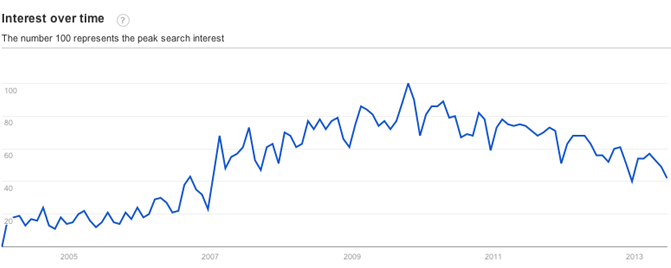Submitted by Dallas Kachan on

How relevant is the term cleantech today? Has it had its day in the sun?
It's a heretical question for someone who's spent much of the last 10 years of his career furthering the cleantech meme globally. A former Managing Director of an organization that gets much of the credit for coining the phrase to begin with, I've been a big proponent of the term, to the intentional subordination of others.
But having just returned from a week of meetings with Silicon Valley investors, lawyers and others, I find myself facing the reality that intelligentsia in the sector are distancing themselves from the phrase.
In five days last week, I met face-to-face with two private equity investors, four venture capitalists, two lawyers, an entrepreneur and one of the heads of innovation for a global multinational—all with name-brand firms, all power players associated with some of the biggest deals cleantech has seen. I asked them each about the topic. And while all were quick to affirm their belief in strong future demand for what we think of as clean or green technologies, the term cleantech has undeniably fallen from favor, they said. Why?
- Cleantech has become built into every sector, with clean/green propositions in many technology verticals, from industry to IT to water to energy to agriculture; "cleantech no longer means anything new anymore," one said
- Cleantech is simultaneously "too broad" (i.e. somatic shorthand for too many vertical industries) and "too narrow" (i.e. become too closely associated with renewable energy to those who don't recognize the intended breadth as defined by Kachan & Co. and others) to be useful any longer, another said
- But the biggest reason—that we've written about for some time here, here and here—is that venture funds' Limited Partner investors have been underwhelmed (some used the term "burned") by cleantech too much for too long, and the term is now poisonous for some venture partners; some are distancing themselves from it. Some have let go of their teams. So while there may still be relatively wide general industry momentum for the term cleantech, because lexicons don't change overnight, those at the very center of the space that we've thought of as cleantech are quietly starting to use other phrases. Deloitte, for instance, rebranded its annual invitation-only Napa Valley cleantech event last week as Energy Tech. Is it just a matter of time until others start picking similar monikers?
Virtually all I met with agreed that what we've thought of as cleantech to date is still an investable thesis: There's still resource scarcity. Governments are still seeking energy independence. Climate change is accelerating, not abating. Large corporations continue to have an appetite for clean technologies for cost savings, differentiation vs. competitors and as high margin product offerings. So the markets for clean and green technologies are expected to be sustaining and long-term. But will there continue to be a unified name for the sector? Will the term cleantech rebound in popularity? Cleantech, at the time of this writing, appears to be in what IT analyst company Gartner calls the "trough of disillusionment" in its widely-referenced "hype cycle" model:

Cleantech is arguably suffering a correction from hyperbole that also characterized the early PC, Internet, networking and other technology sectors—all of which recovered in some form as expectations mapped more realistically to execution. Will cleantech as a term do the same? Source: Gartner.
So the question appears to be: Will cleantech as a meme emerge on the other side of this trough, regaining market momentum and credibility much like PCs, the Internet, networking and Internet applications did when they went through the trough themselves? As another datapoint, if cleantech is indeed in a trough, it's been slipping into it for a while, now. A historical look at Google search data for the term cleantech, current up to the time of this writing:

Google search history of term "cleantech" over time. Interest in the term peaked in late 2009 and has been declining since. What does this mean for companies positioning around the term? Will it recover or not? What would YOU bet? Source: Google.
Will cleantech re-emerge, regain in popularity and follow the Gartner curve back up? Or has its usefulness as a distinction ended? If the term is no longer fashionable, what should this space be called? What would you advise entrepreneurs in this sector to position around? We're very interested in your thoughts here at Kachan & Co., where we work exclusively with cleantech companies... or what we used to call cleantech companies! Leave a comment below.
A former managing director of the Cleantech Group, Dallas Kachan is now managing partner of Kachan & Co., a cleantech research and advisory firm that does business worldwide from San Francisco, Toronto and Vancouver. The company publishes research on clean technology companies and future trends, offers consulting services to large corporations, governments, service providers and cleantech vendors, and connects cleantech companies with investors through its Hello Cleantech™ programs. Kachan staff have been covering, publishing about and helping propel clean technology since 2006. Details at www.kachan.com.

Comments
Advanced energy?
Permalink Submitted by Kurt C. Koehler (not verified) on Mon, 07/22/2013 - 11:24.
Instead of Clean Tech, how about Advanced Energy or Basic Energy. In the transportation industry, CNG is considered a bridge fuel to hydrogen. Hydrogen is both more advanced then burning coal and is chemically much more simple then cracking long chains of hydrocarbons to make gasoline. New Energy or Next Generation Energy also come to mind.
"Clean tech"
Permalink Submitted by Andrew West (not verified) on Mon, 07/22/2013 - 12:10.
Clean Tech is too vague and besides the "trough of dillusionnent," I think it has a reputation for being insignificant - for investors and for the myriad of problems that need solutions. Energy Tech, AG Tech, Water Tech, may begin to make sense, but would likely suffer the same fate.
I believe our collective thinking is way too incremental and we celebrate innovation, instead of seeking invention. Many of these industries need to be RE-invented, like agriculture, energy, education and healthcare. Despite a full decade of clean tech investing or "green" tech, we really haven't made any measurable difference in saving our problems. As an example, our Healthcare Industry is currently about $3 trillion annually, yet actual healthcare delivered is only $1.5 trillion (50%). At least on the surface we are wasting at least $1 trillion. Recent government reforms have the uninspiring goal of "bending the cost curve" and do nothing to make the industry more effective and efficient. The only way to save our healthcare system is to replace it with a new one. I'm working with a group to do that and avoiding the traditional trap of feel-good innovations that don't make a significant difference.
I appreciate your column and wonder if the search for a new name might make it obvious that a focus on re-creating our inefficient industries need big change, rather than small steps.
I'm working with dozens of people and organizations to create America 2.0, a collection of seven solutions that solve our problems with economically-viable solutions that make a significant difference and create 12 million non-subsidized jobs. If we don't figure out how to re-create several of our industries AND create a significant number of jobs, all the imagined "innovation" won't make a difference.
I can be reached at Solutioneur@gmail.com
Unfortunate
Permalink Submitted by Dragana Mendel (not verified) on Tue, 12/10/2013 - 17:22.
It is very unfortunate that cleantech term is being shunned and I truly hope that the word will survive Gartner’s phase of disillusionment and continue to to be a mainstream business term. Cleantech has been given a bad name by few bad apples such as Solindra and very expensive biofuel plants that didn’t produce any commercially viable results. I understand that some leading venture capitalist firms have been burned by “cleantech” investment, pouring hundreds of millions of dollars into capital extensive projects for technologies that never scaled up properly out of lab environment. However, that doesn’t mean that we as a society don’t have to continue inventing new technologies and business models that will help us use less energy, less materials, reuse more and pollute less.
Yes, cleantech is too broad definition, but I see that as a positive aspect as the word itself makes the need to be more respectful about our environment salient. Each and every industry can improve its processes to consume less materials and energy, which is the goal we should strive for.
Into every sector today
Permalink Submitted by Maria Qureshi (not verified) on Tue, 12/17/2013 - 03:24.
I think cleantech was able to keep its name globally within the last 10 years. It is very nice to hear that cleantech has become built into every sector today.
Hello....it's a nice review
Permalink Submitted by skandinavia (not verified) on Sun, 03/30/2014 - 03:52.
Hello....it's a nice review
Add new comment